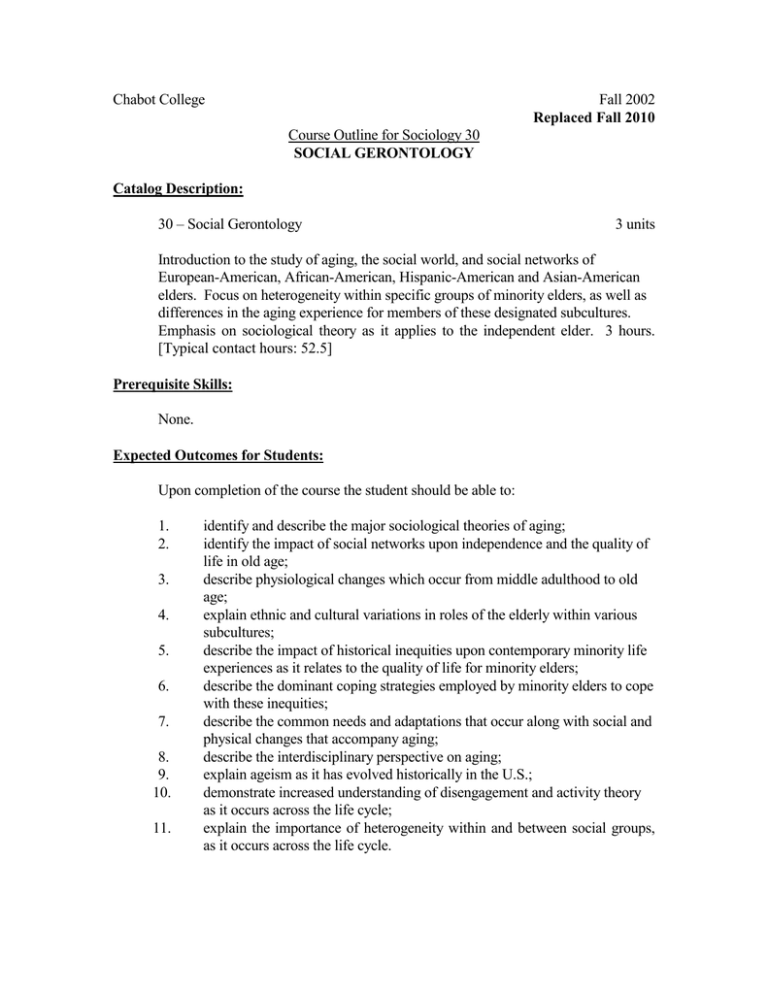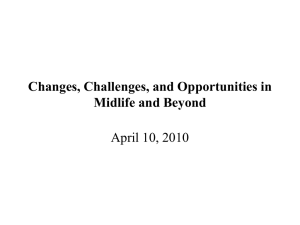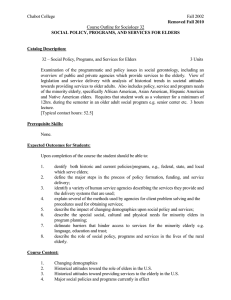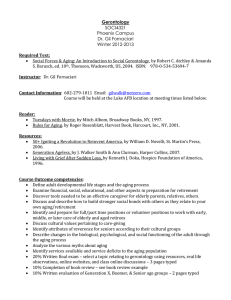Chabot College Fall 2002 Course Outline for Sociology 30
advertisement

Chabot College Fall 2002 Replaced Fall 2010 Course Outline for Sociology 30 SOCIAL GERONTOLOGY Catalog Description: 30 – Social Gerontology 3 units Introduction to the study of aging, the social world, and social networks of European-American, African-American, Hispanic-American and Asian-American elders. Focus on heterogeneity within specific groups of minority elders, as well as differences in the aging experience for members of these designated subcultures. Emphasis on sociological theory as it applies to the independent elder. 3 hours. [Typical contact hours: 52.5] Prerequisite Skills: None. Expected Outcomes for Students: Upon completion of the course the student should be able to: 1. 2. 3. 4. 5. 6. 7. 8. 9. 10. 11. identify and describe the major sociological theories of aging; identify the impact of social networks upon independence and the quality of life in old age; describe physiological changes which occur from middle adulthood to old age; explain ethnic and cultural variations in roles of the elderly within various subcultures; describe the impact of historical inequities upon contemporary minority life experiences as it relates to the quality of life for minority elders; describe the dominant coping strategies employed by minority elders to cope with these inequities; describe the common needs and adaptations that occur along with social and physical changes that accompany aging; describe the interdisciplinary perspective on aging; explain ageism as it has evolved historically in the U.S.; demonstrate increased understanding of disengagement and activity theory as it occurs across the life cycle; explain the importance of heterogeneity within and between social groups, as it occurs across the life cycle. Chabot College Course Outline for Sociology 30 Fall 2002 Page 2 Course Content: 1. Aging in America a. Images of aging in the U.S. 1) Cultural emphasis on youth 2) Cultural stereotypes of aging and their effects b. 2. 3. Demographic data 1) Population trends 2) Social and economic characteristics Theories of aging a. Sociological 1) Social integration of the elderly 2) Socialization to old age 3) Exchange theory 4) Labeling theory 5) Disengagement theory 6) Activity theory Minority and majority elder populations a. Retirement 1) Changes in income and activity 2) Isolation b. Common needs and adjustments of the independent older adult 1) Health care and physical fitness 2) Nutrition 3) Housing – age segregated and age integrated 4) Intellectual stimulation 5) Interpersonal involvement c. Societal response to needs of elderly 1) Legislation and federal programs 2) Community resources d. The aging subcultures of African Americans, Hispanic Americans, and Asian Americans. 1) Demographics and aging trends 2) Definitions and roles of the elderly 3) Social networks 4) Family role change 5) Disparities in health and longevity 6) Historical inequities and their impact upon the quality of life and coping mechanisms in old age Chabot College Course Outline for Sociology 30 Fall 2002 Page 3 Methods of Presentation: 1. 2. 3. 4. 5. Lecture Guided discussion Small group activities Audio-visuals Field trips Assignments and Methods of Evaluating Student Progress: 1. Typical Assignments a. Interview children on attitudes towards the elderly b. Written assignment on what is a cohort and how the concept is used in gerontology c. Group assignment to write a children’s picture book that presents positive images of aging d. Interview an elder on Erikson’s last stage of development integrity vs despair e. Case study of minority elder 2. Methods of Evaluating Student Progress a. Grades A-F based upon the quality of student work as demonstrated in quizzes, midterm, final, individual and group assignments b. Clarity, accuracy, and effectiveness in presenting concepts discussed in class c. Critical thinking in sociological analysis the role, status, value, etc. of the elderly in the majority elderly population as well as minority elderly populations d. Ability to problem solve Special Student Materials: None. Textbook(s)(Typical): Social Gerontology, Hooyman N. & Kiyah (1996), 4th ed.. Boston, Mass. Allyn & Bacon, 2001, or latest edition. Worlds of Difference-Inequality in the Aging Experience, Stroller, E.P. & Gibson, R.C. (1994), Thousand Oaks, CA. Pine Forge Press, 2001, or latest edition. Tf:A:/WORD.SOC.30.DOC Revised-2-5-2002


